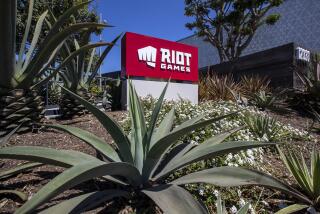Chinese governments hand out cash, subsidies to encourage esports development
Forget medical school and engineering degrees. With a record 8.3 million university graduates this year, Beijing is urging its best and brightest to take up competitive video gaming.
Esports professionals can make triple the national average salary, according to the Ministry of Human Resources and Social Security. As the economy slows, pouring resources into China’s night-shift GDP might just be wacky enough to work.
Municipal governments have taken the hint, luring gaming clubs with cash handouts and other perks. The resort island of Hainan is setting up a $150-million development fund and giving as much as $1.5 million in subsidies for international tournaments. Shanghai’s Yangpu district offers a 30% rental discount to businesses in the sector.
The push has made unlikely pairings of 60-year-old local bureaucrats and thirtysomething esports executives. Pan Jie, nicknamed “the Queen” among China’s professional gamers, has learned that Bohemian dresses and video game T-shirts don’t go over well when officials visit the Hangzhou headquarters of her club, LGD-Gaming, one of China’s largest.
With government support, Pan Jie’s dream of operating her own esports stadium is getting closer to fruition. Still, you’d be forgiven for doubting that layers of statist procedure can springboard the competitive video gaming sector, particularly when China’s private enterprises are already struggling to get the funding they need.
Having scouted venues across China, Pan Jie settled on a plot of land on the outskirts of Hangzhou, within a shantytown development zone located in the Xia Cheng district. Beijing has been working to revive these areas since 2015, with the central bank flying in more than 3.5 trillion yuan of helicopter money to support such projects through pledged loans.
The Xia Cheng district is hoping that a new esports park — along with the tourism and tech jobs it can generate — will bring in more than $150 million, more than 10% of the fiscal revenue it collected in 2018. Judging from a publication by the district’s news office, officials seem to have outlined concrete policies rather than grand promises.
Indeed, the local government was quick to act, tearing down old residential buildings to make space for the new construction, which will eventually house as many as 1,000 start-ups. To help LGD-Gaming move into the new center by its May deadline, officials even called furniture shops late at night, demanding employees work overtime to meet the company’s needs.
Xia Cheng has entrenched business interests to deal with. Hangzhou is home to China’s wealthiest businesses, including Alibaba Group Holding Ltd. Smack at the center of the esports zone is a huge, five-story warehouse occupied by Zhejiang Food Stuff Corp., a provincial champion known for its cured ham. The district has to wait for the company to build another site before any demolition can begin. For the time being, start-ups have occupied a small corner of the redevelopment zone, and Quantum Capital, a Shenzhen venture capital firm, postponed opening a branch there.
Over the next five years, China’s competitive video gaming industry can absorb close to 2 million workers, according to the Ministry of Human Resources. But throwing cash at an idea isn’t enough. Bureaucrats will need to show that they can work effectively with what they once called the “lost souls” of the gig economy.
During a recent visit to LGD-Gaming, one official pooh-poohed a hipster barbecue joint inside the esports park: Grilling lamb chops on an open pit? How undignified, he apparently complained. The business was shut within days.
“We were sad for a while, because their lamb tasted great,” Pan Jie lamented.






